Unit 1 Where did you go on vacation?Section A (Grammar Focus-3c)课件(共65张PPT)
文档属性
| 名称 | Unit 1 Where did you go on vacation?Section A (Grammar Focus-3c)课件(共65张PPT) |
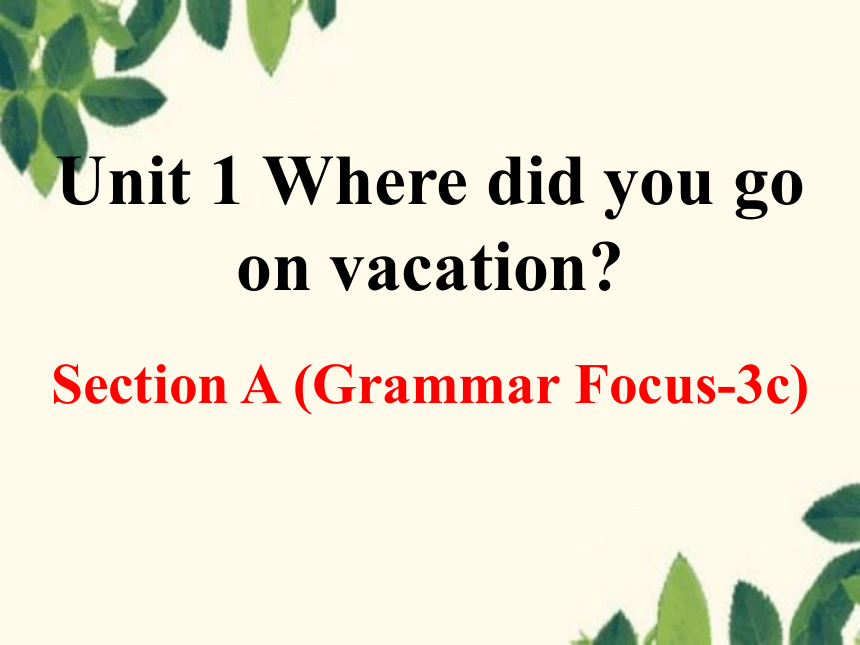
|
|
| 格式 | pptx | ||
| 文件大小 | 1.0MB | ||
| 资源类型 | 教案 | ||
| 版本资源 | 人教新目标(Go for it)版 | ||
| 科目 | 英语 | ||
| 更新时间 | 2023-05-09 00:00:00 | ||
图片预览

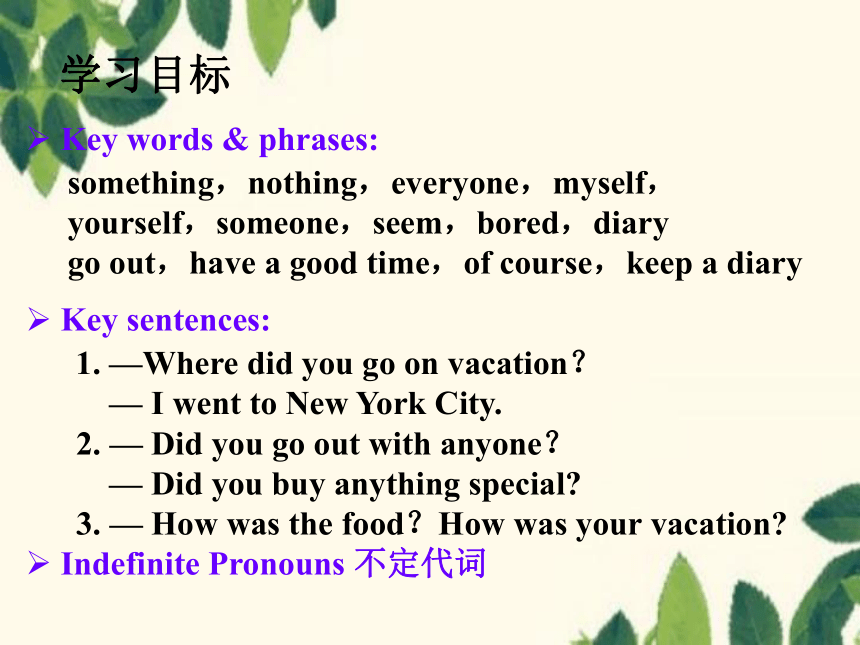
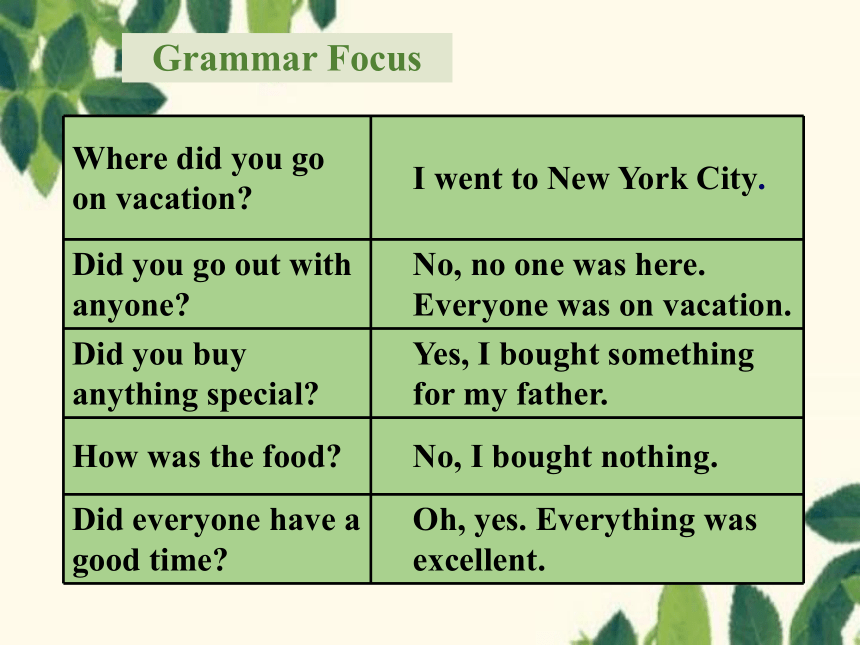
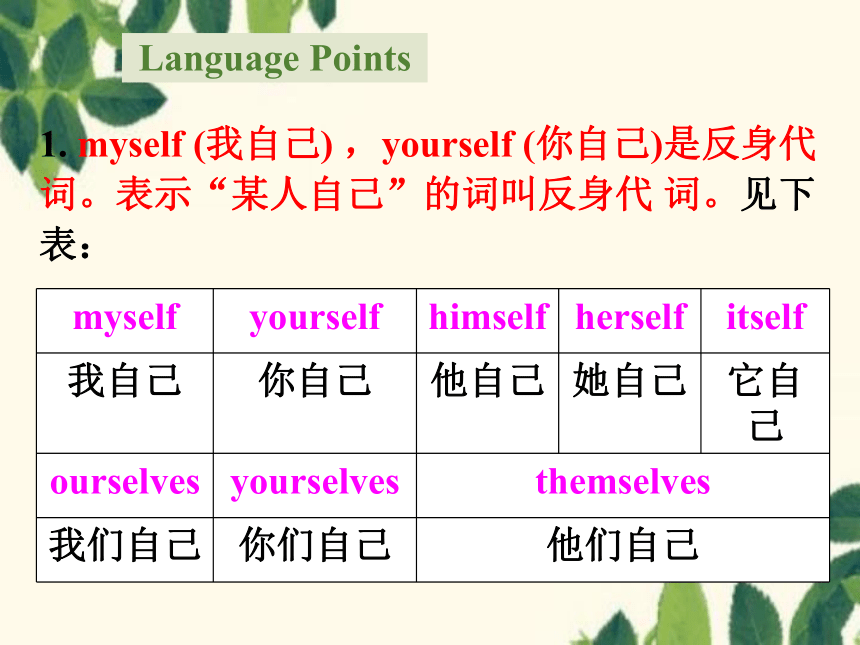
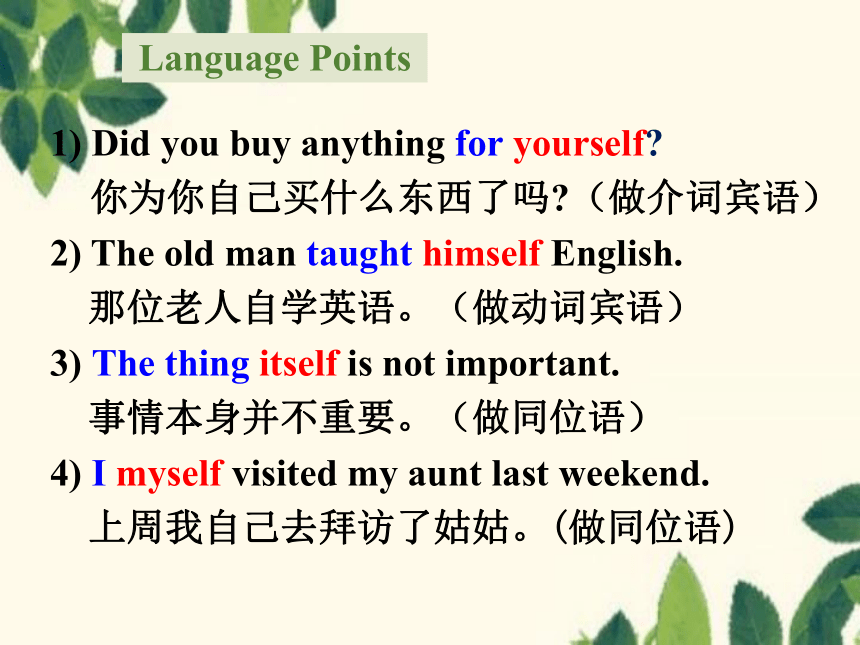

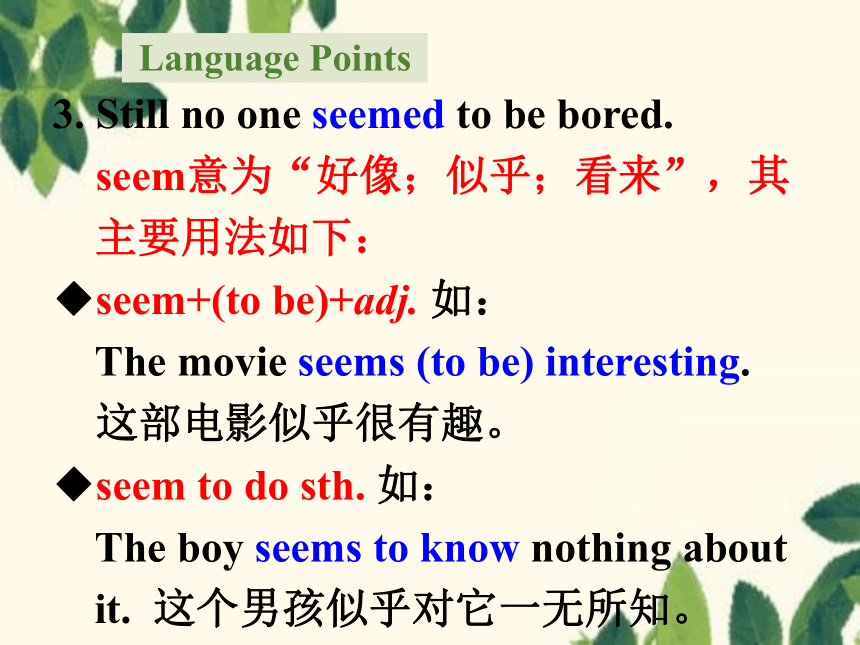
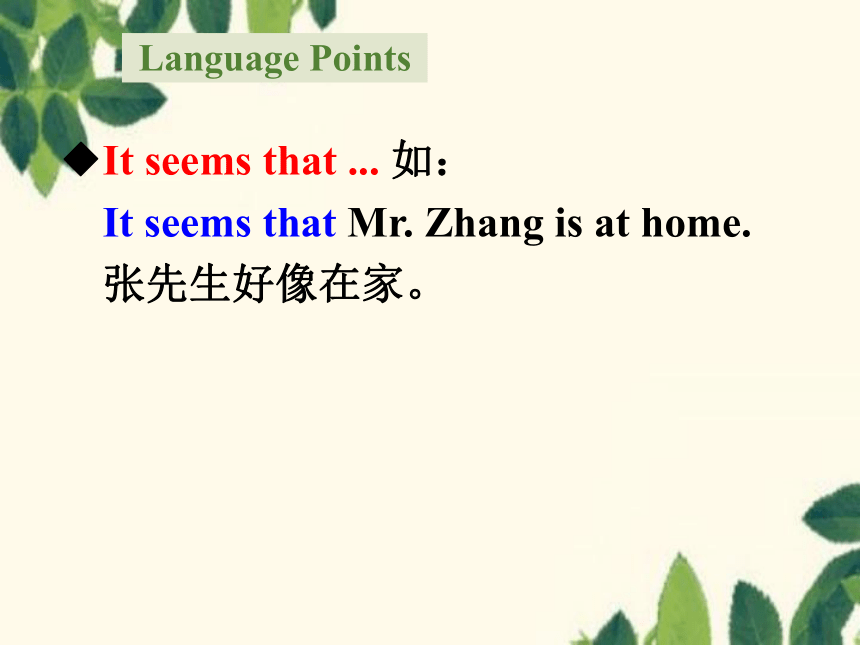
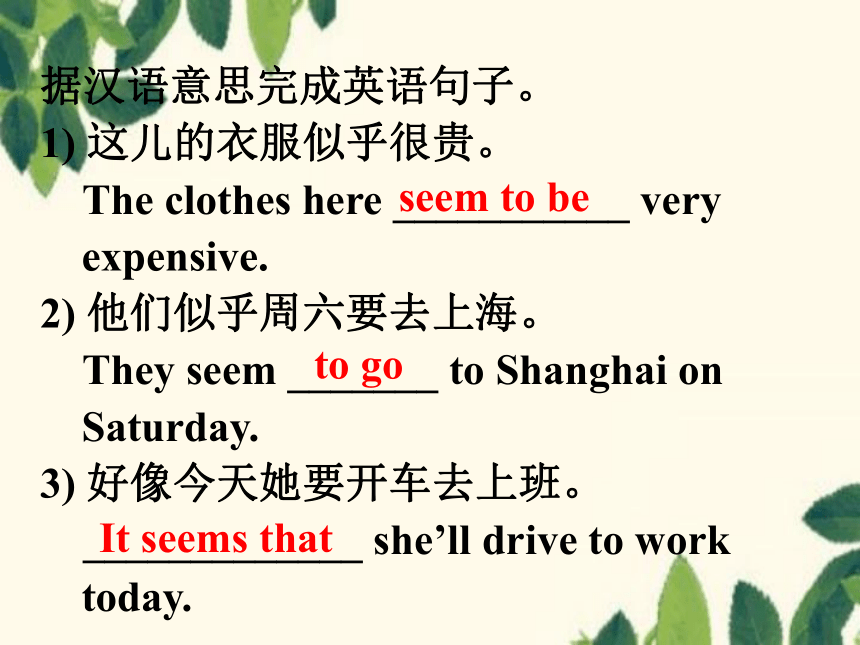
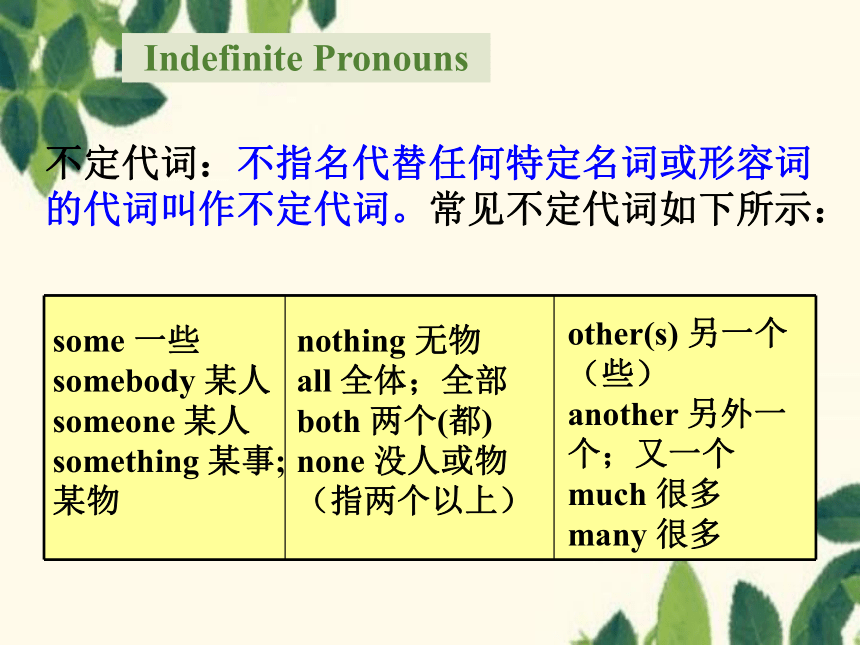
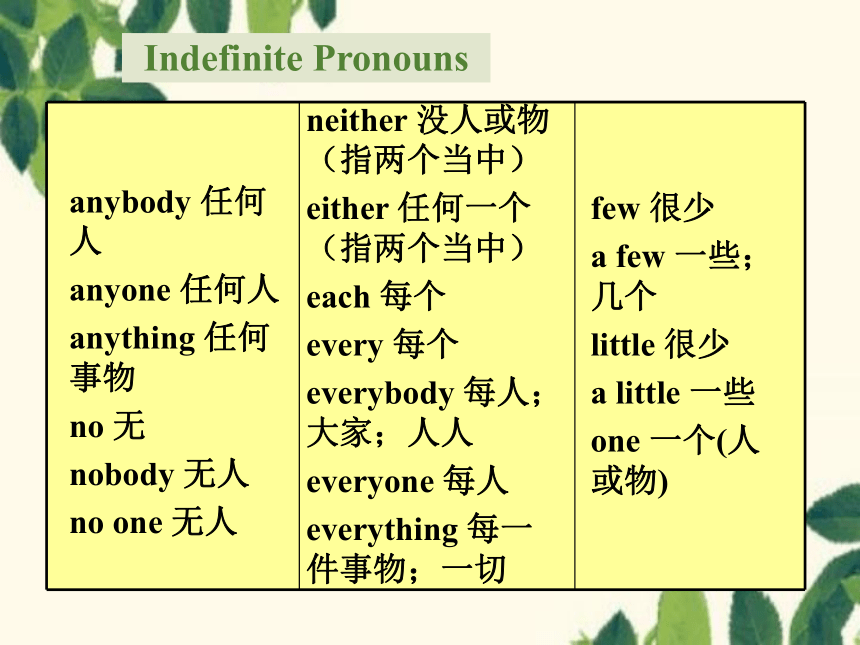
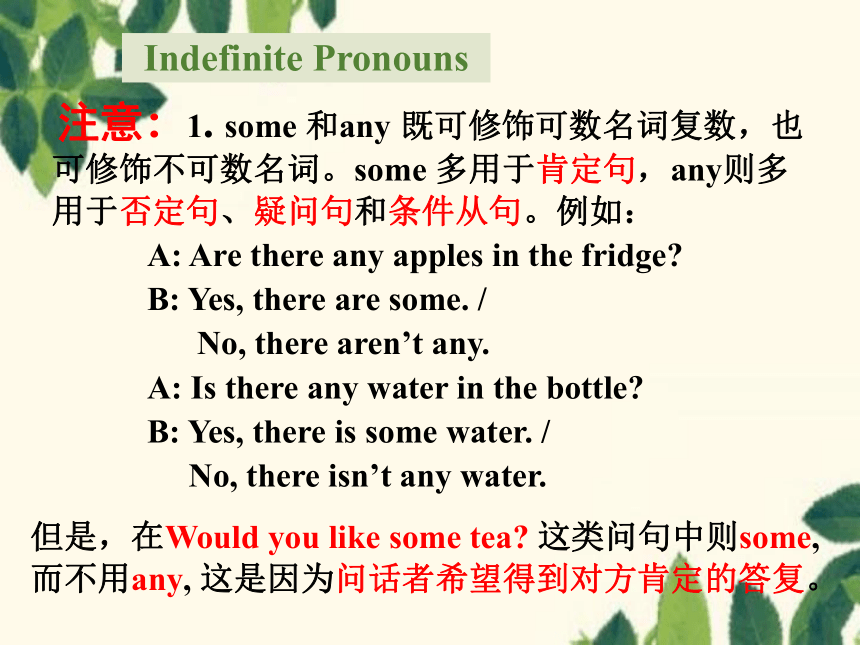
文档简介
(共65张PPT)
Section A (Grammar Focus-3c)
Unit 1 Where did you go on vacation
学习目标
Key words & phrases:
something,nothing,everyone,myself,
yourself,someone,seem,bored,diary
go out,have a good time,of course,keep a diary
Key sentences:
1. —Where did you go on vacation?
— I went to New York City.
2. — Did you go out with anyone?
— Did you buy anything special
3. — How was the food?How was your vacation
Indefinite Pronouns 不定代词
Grammar Focus
Where did you go on vacation I went to New York City.
Did you go out with anyone No, no one was here. Everyone was on vacation.
Did you buy anything special Yes, I bought something for my father.
How was the food No, I bought nothing.
Did everyone have a good time Oh, yes. Everything was excellent.
Language Points
1. myself (我自己) ,yourself (你自己)是反身代词。表示“某人自己”的词叫反身代 词。见下表:
myself yourself himself herself itself
我自己 你自己 他自己 她自己 它自己
ourselves yourselves themselves
我们自己 你们自己 他们自己
Language Points
1) Did you buy anything for yourself
你为你自己买什么东西了吗 (做介词宾语)
2) The old man taught himself English.
那位老人自学英语。(做动词宾语)
3) The thing itself is not important.
事情本身并不重要。(做同位语)
4) I myself visited my aunt last weekend.
上周我自己去拜访了姑姑。(做同位语)
2. How did you like it
句型How ... sb. like ... 与What ... sb. think of ... 同义,意为“某人觉得……怎么样?”。如:
How do you like the TV show
=What do you think of the TV show
你觉得这个电视节目怎么样?
Language Points
3. Still no one seemed to be bored.
seem意为“好像;似乎;看来”,其主要用法如下:
◆seem+(to be)+adj. 如:
The movie seems (to be) interesting.
这部电影似乎很有趣。
◆seem to do sth. 如:
The boy seems to know nothing about it. 这个男孩似乎对它一无所知。
Language Points
◆It seems that ... 如:
It seems that Mr. Zhang is at home.
张先生好像在家。
Language Points
据汉语意思完成英语句子。
1) 这儿的衣服似乎很贵。
The clothes here ___________ very expensive.
2) 他们似乎周六要去上海。
They seem _______ to Shanghai on Saturday.
3) 好像今天她要开车去上班。
_____________ she’ll drive to work today.
seem to be
to go
It seems that
Indefinite Pronouns
不定代词:不指名代替任何特定名词或形容词的代词叫作不定代词。常见不定代词如下所示:
some 一些
somebody 某人
someone 某人
something 某事; 某物
nothing 无物
all 全体;全部
both 两个(都)
none 没人或物(指两个以上)
other(s) 另一个(些)
another 另外一个;又一个
much 很多
many 很多
anybody 任何人
anyone 任何人
anything 任何事物
no 无
nobody 无人
no one 无人
neither 没人或物 (指两个当中)
either 任何一个(指两个当中)
each 每个
every 每个
everybody 每人;大家;人人
everyone 每人
everything 每一件事物;一切
few 很少
a few 一些;几个
little 很少
a little 一些
one 一个(人或物)
Indefinite Pronouns
但是,在Would you like some tea 这类问句中则some, 而不用any, 这是因为问话者希望得到对方肯定的答复。
A: Are there any apples in the fridge
B: Yes, there are some. /
No, there aren’t any.
A: Is there any water in the bottle
B: Yes, there is some water. /
No, there isn’t any water.
注意:1. some 和any 既可修饰可数名词复数,也可修饰不可数名词。some 多用于肯定句,any则多用于否定句、疑问句和条件从句。例如:
Indefinite Pronouns
There are ______ tables in the room, but there aren’t _______ chairs.
2. Would you like ______ milk
3. Will you give me ______ paper
Fill in the blanks with some or any.
some
any
some
some
Indefinite Pronouns
2. 由some, any, no, every 构成的复合不定代词作主语时,都作单数看待,其谓语动词用第三人称单数形式。例如:
Something is wrong with my watch.
Well, everyone wants to win.
Nobody knows what the future will be like.
There is something for everyone at Greenwood Park.
Indefinite Pronouns
3. 除no one 以外,其他复合不定代词都写成一个词。
4. 不定代词若有定语修饰,该定语要置于其后。例如:
Did anyone see something good at the cinema
For lunch, we had something very special--Malaysian yellow noodles.
Do you have anything to say
Indefinite Pronouns
3a
Fill in the blanks with the words in the box and practice the conversation.
Linda: Did you do ________ fun on
your vacation, Alice
Alice: Yes, I did. I went to Sanya.
Linda: How did you like it
Alice: Well, it was my first time
there, so _________ was really
interesting.
anyone
something
anything
everything
nothing
anything
everything
Linda: Did you go with ________
Alice: Yes, I did. I went with my sister.
Linda: Did you go shopping
Alice: Of course! I bought _________ for
my parents, but _______ for myself.
Linda: Why didn’t you buy ________ for
yourself
Alice: I didn’t really see ________ I liked.
anyone
something
nothing
anything
anything
3b
Fill in the blanks in the e-mail message with the words in the box.
anything everything nothing
everyone no one
Dear Bill,
How was your vacation Did you do ________ interesting Did ________ in the family go with you I went to a friend’s farm in the countryside with my family.
anything
everyone
___________ was great. We fed some hens and saw some baby pigs. They were so cute! The only problem was that there was _______ much to do in the evening but read. Still _______ seemed to be bored. Bye for now!
Mark
Everything
nothing
no one
3c
Ask your group questions about their last
vacation. Then tell the class your results.
Did you… Everyone Someone No one
eating anything at a restaurant
read anything interesting
Visit anyone in your family
Buy anything
Keep a diary
In our group, everyone ate something at a restaurant
Pairwork
Where did … go on vacation
…
stayed at home
Where did … go on vacation
…
went to Sanya
/ the beach
Where did … go on vacation
…
went shopping
Where did … go on vacation
…
went to a friend’s farm
Explanation
--Where did you go on vacation
--I went to New York City.
(1) Where did you go… 是一般过去时的疑问
句,did是助动词.
(2) went是 go 的过去式,实义动词的过去式
没有人称和数的变化。
(3) 实义动词一般过去式的一般疑问句以助动词did开头。如:
①--What did you do yesterday afternoon
你昨天下午在做什么
--I played volleyball with my friend.
我和我的朋友一起打排球。
②-- Did you have a good time
你们玩得很高兴吗
--Yes, We did.是的,很高兴。
③-- Did she come to help you
她来帮助过你吗
-- No, she didn’t.不,她没有。
Explanation
Explanation
一般过去时
构成
用法
动词的过去式
1. 表示过去某个时间发
生的动作或存在的状态。
2. 表示过去经常或
反复发生的动作。
(the day before) yesterday
last night / week
in 1990 / just now
On Sunday morning
two days ago
一般过去时
标志词
The simple past tense
Explanation
定义:
1) 表示过去某个时间发生的动作或存在的状态,
常和表示过去的时间状语(如yesterday, last
night, in 1990, two days ago...)连用;
2) 表示在此之前一段时间内经常或反复发生的
动作, 常与never, always等频度副词连用。
一般过去时
有哪些时间状语可以用来描述过去?
Explanation
一般过去时常与表示过去的时间状语或从句连用
a)时间状语
一段时间+ago(如two hours ago)
yesterday(句子开头或结尾)
the day before yesterday
last week, last (year, night, month…)
Explanation
具体时间(如Jan.fourth)
just now
at the age of
one day
long ago
once upon a time(很久以前)
and so on
this morning
long long ago
Sentences
I did my homework yesterday.
I played soccer last Sunday.
I cleaned my room last week.
I went to the beach three years ago.
I played tennis with my friends last weekend.
I went to the movies three days ago.
Explanation
Explanation
注:“过去”的概念并不是只指带有时间标志的词,如 “yesterday, last week… ” 等,实际上“与现在对立的过去”,亦即“非现在的以前”,哪怕是“过了说话时间的几分钟之前”,只要所要表达的时间与说话时的“现在”形成对立,就必须使用一般过去时来表达。在谈到已死去的人的情况时,多用过去时。例如:
Explanation
He was here only a few minutes ago.
仅仅几分钟前他还在这里。
I came home just now.
我刚回到家。
I got up very early this morning.
今天早晨我起床很早。
He was late for school again today.
今天他又迟到了。
Explanation
动词过去式
的构成
规则动词
regular verbs
不规则动词
irregular verbs
实义动词的变化:
实义动词分规则变化和不规则变化。
1.一般情况下在动词后加-ed。
eg:play—played visit—visited
walk—walked clean—cleaned
2. 以不发音的e结尾的词,在词尾加-d。
eg:note—noted like—liked
dance—danced name—named
规则变化
3.以重读闭音节结尾并且词尾只有一个辅音字母,要先双写这个辅音字母,再加-ed。
eg:stop—stopped
drop—dropped
plan—planned
巧识闭音节:
音节中的元音为 / e /,/ i /,/ a /,/ /,/ u: / 之外的音。例:seem / si m / 开音节 pig / p g / 闭音节
4.以辅音字母加y结尾的单词,先改y为i,再加-ed。
eg:study—studied
carry—carried
不规则变化需要按一定的规律逐个记忆。
不规则变化
1. be动词的变化:
am
is
was
are
were
2. 助动词do的变化:do→ did
如:Did you play soccer yesterday
Did he play soccer yesterday
规则动词过去式词尾-ed的读音
读音规则 读 音 例 词
在浊辅音和元音后面 /d/ moved /mu:vd/
在清辅音后面 /t/ passed /pa:st/
在t、d后面 / d/ needed /'ni:d d/
am, is—was are—were
go—went do—did
have—had come—came
take—took say—said
eat—ate see—saw
get—got put—put
sleep—slept give—gave
write—wrote read—read
动词不规则变化
/red/
buy—bought sit—sat
run—ran make—made
feel—felt hear—heard
grow—grew tell—told
know—knew find—found
begin—began bring —brought
stand—stood spend—spent
catch—caught teach—taught
swim —swam
动词不规则变化
基本结构:
be动词的过去式;实义动词的过去式
Present Past
am was
is was
are were
单数 复数
I was we were
you were (一個人) you were
(不只一人)
she was
they were
he was
it was
系动词be的过去时
am (is) →was are →were
陈述句:He was at home yesterday.
否定句:He wasn’t at home yesterday.
疑问句:Was he at home yesterday
Yes, he was./ No, he wasn’t.
句子构成:
肯定句:主语+was (were) +表语.
如:I was late yesterday.
昨天我迟到了。
否定句:主语+was (were) +not+表语.
如:We weren't late yesterday.
我们昨天没迟到
Be动词的一般过去时态构成:
疑问句:Was (Were) +主语+表语
如: Were you ill yesterday
你昨天病了吗?
肯定回答: Yes, I was. 是的,我病了。
否定句: No, I wasn't. 不,我没病。
特殊疑问句:特殊疑问词+was (were) +主语
+表语
如: When were you born
你是什么时候出生的?
肯定句要使用动词的过去式,否定句和疑问句要使用助动词do和 does 的过去式 did.
肯定句: 主语+动词过去式+宾语.
如: I went home at nine o'clock yesterday.
我昨天九点钟回家。
否定句: 主语+didn't +动词原形+宾语.
如:I didn't go home yesterday.
我昨天没回家。
实义动词的一般过去时态
一般疑问句: Did +主语+动词原形+宾语
如: Did you go home yesterday
你昨天回家了吗?
肯定回答:Yes, I did.
是的,我回了。
否定回答:No, I didn't.
不,我没回家。
行为动词的一般过去时:
陈述句:主语+动词过去式+其他?
否定句:主语+助动词didn’t+动词原形+其他?
I go to the movie. →I went to the movie.
I don’t go to school today. →I didn’t go to school.
特殊疑问句:疑问词+did+主语+动词原形+其他?
一般疑问句:Did +主语+动词原形+其他?
When do you visit the Great Wall
→When did you visit the Great Wall
Do you have breakfast →Did you have breakfast
Yes, I do./No, I don’t. → Yes, I did./No, I didn’t.
一般过去式的构成形式
肯定式 疑问式 否定式
I worked Did I work I did not work
He /she/it worked Did He /she/it work He /she/it did not work
We worked Did we work We did not work
You worked Did you work You did not work
they worked Did they work They did not work
Past 过去
Now 现在
go to the movies
do my homework
play tennis
play soccer
clean the room
went to the movies
did my homework
played tennis
played soccer
cleaned the room
记忆口诀
动词一般过去时,表示过去发生的事;
be用was或用were, have,has变had;
谓语动词过去式,过去时间作标志;
一般动词加-ed,若是特殊得硬记。
否定句很简单,主语之后didn’t添;
疑问句也不难,did放在主语前;
如果谓语之前有did,谓语动词需还原;
动词若是was,were,否定就把not添。
Exercises
It was sunny.
I did my homework yesterday.
She played soccer last Sunday.
He cleaned his room last week.
Did you do…
Did she play…
Did he clean…
Was it…
Exercises
They had a summer camp last weekend.
My father went to the beach three years ago.
Tom and Jack studied for the test three days ago.
Did they have…
Did Tom and Jack study…
Did your father go…
It was sunny.
I did my homework yesterday.
She played soccer last Sunday.
He cleaned his room last week.
did not do
did not play
did not clean
not
Exercises
Exercises
They had a summer camp last weekend.
My father went to the beach three years ago.
Tom and Jack studied for the test three days ago.
did not have
did not go
did not study
1.get-- 2.say-- 3.have--
4.be-- 5.tell-- 6.think--
7.write-- 8.drive-- 9.run--
10.read-- 11.see-- 12.stand--
13.put-- 14.eat-- 15.buy--
16.drink-- 17.sleep-- e--
19.play-- 20.study--
21.listen--
给下面的单词写出过去式。
got
said
had
was, were
told
thought
wrote
drove
ran
read
saw
stood
put
ate
bought
drank
slept
came
played
studied
listened
一般过去时态练习
We ______ (live) in Japan last year.
Jack ________ (stop) the car last Sunday.
Tom _______ (clean) my room and ______(study).
for the Chinese test last weekend.
4.What ______ you ______(do) last night
5.On Sunday morning I _____ (play) tennis.
lived
stopped
cleaned
studied
did
do
played
用所给动词的适当形式填空。
1. _____ you ____________(remember) to buy the oranges
2.Who _________ (play) the computer games yesterday
3.We ________(go) to the movie last night. The film _____(be)
very good.
4.What time _____ you ______ (get) to school this morning
5.Jim _____(do) a lot yesterday. He ________(go) shopping and _________ (cook) supper.
Did
remember
played
went
was
did
get
did
went
cooked
用所给词的适当形式填空。
PRACTICE
改写句子:
1、Lucy did her homework at home.(改否定句)
Lucy _______ _______ her homework at home.
2、He found some meat in the fridge.(变一般疑问句)
______ he _____ ______ meat in the fridge
3、She stayed there last week.(对划线部分提问)
______ ______ she _____ there
4、There was some orange in the cup.(变一般疑问句)
_____ there _____ orange in the cup
didn’t do
Did find any
When did stay
Was any
PRACTICE
5. She went to the beach last Sunday.
(变为一般疑问句)
6.They stayed at home on vacation.
(对划线部分提问)
Did she go to the beach last Sunday
Where did they stay on vacation
PRACTICE
7. The weather was hot and humid. (变否定句)
8. Nancy went to the cinema last night.
(改为同义句)
9. The people in New York were friendly.
(对划线部分提问)
The weather wasn't hot or humid.
Nancy went to see a film last night.
How were the people in New York
Summary
2.Target language:
①A:Where did you go on vacation
B:I went to New York City.
②A:Did you buy anything special
B:Yes,I bought something for my father.
3.Structure:something special
1.The vocabulary:something,nothing,everyone,someone,myself,yourself,go out,of course
书面作业 (Writing work)
(1)默写所学的新单词
(2) 完成学生用书的相关作业
Homework
谢谢观看
Section A (Grammar Focus-3c)
Unit 1 Where did you go on vacation
学习目标
Key words & phrases:
something,nothing,everyone,myself,
yourself,someone,seem,bored,diary
go out,have a good time,of course,keep a diary
Key sentences:
1. —Where did you go on vacation?
— I went to New York City.
2. — Did you go out with anyone?
— Did you buy anything special
3. — How was the food?How was your vacation
Indefinite Pronouns 不定代词
Grammar Focus
Where did you go on vacation I went to New York City.
Did you go out with anyone No, no one was here. Everyone was on vacation.
Did you buy anything special Yes, I bought something for my father.
How was the food No, I bought nothing.
Did everyone have a good time Oh, yes. Everything was excellent.
Language Points
1. myself (我自己) ,yourself (你自己)是反身代词。表示“某人自己”的词叫反身代 词。见下表:
myself yourself himself herself itself
我自己 你自己 他自己 她自己 它自己
ourselves yourselves themselves
我们自己 你们自己 他们自己
Language Points
1) Did you buy anything for yourself
你为你自己买什么东西了吗 (做介词宾语)
2) The old man taught himself English.
那位老人自学英语。(做动词宾语)
3) The thing itself is not important.
事情本身并不重要。(做同位语)
4) I myself visited my aunt last weekend.
上周我自己去拜访了姑姑。(做同位语)
2. How did you like it
句型How ... sb. like ... 与What ... sb. think of ... 同义,意为“某人觉得……怎么样?”。如:
How do you like the TV show
=What do you think of the TV show
你觉得这个电视节目怎么样?
Language Points
3. Still no one seemed to be bored.
seem意为“好像;似乎;看来”,其主要用法如下:
◆seem+(to be)+adj. 如:
The movie seems (to be) interesting.
这部电影似乎很有趣。
◆seem to do sth. 如:
The boy seems to know nothing about it. 这个男孩似乎对它一无所知。
Language Points
◆It seems that ... 如:
It seems that Mr. Zhang is at home.
张先生好像在家。
Language Points
据汉语意思完成英语句子。
1) 这儿的衣服似乎很贵。
The clothes here ___________ very expensive.
2) 他们似乎周六要去上海。
They seem _______ to Shanghai on Saturday.
3) 好像今天她要开车去上班。
_____________ she’ll drive to work today.
seem to be
to go
It seems that
Indefinite Pronouns
不定代词:不指名代替任何特定名词或形容词的代词叫作不定代词。常见不定代词如下所示:
some 一些
somebody 某人
someone 某人
something 某事; 某物
nothing 无物
all 全体;全部
both 两个(都)
none 没人或物(指两个以上)
other(s) 另一个(些)
another 另外一个;又一个
much 很多
many 很多
anybody 任何人
anyone 任何人
anything 任何事物
no 无
nobody 无人
no one 无人
neither 没人或物 (指两个当中)
either 任何一个(指两个当中)
each 每个
every 每个
everybody 每人;大家;人人
everyone 每人
everything 每一件事物;一切
few 很少
a few 一些;几个
little 很少
a little 一些
one 一个(人或物)
Indefinite Pronouns
但是,在Would you like some tea 这类问句中则some, 而不用any, 这是因为问话者希望得到对方肯定的答复。
A: Are there any apples in the fridge
B: Yes, there are some. /
No, there aren’t any.
A: Is there any water in the bottle
B: Yes, there is some water. /
No, there isn’t any water.
注意:1. some 和any 既可修饰可数名词复数,也可修饰不可数名词。some 多用于肯定句,any则多用于否定句、疑问句和条件从句。例如:
Indefinite Pronouns
There are ______ tables in the room, but there aren’t _______ chairs.
2. Would you like ______ milk
3. Will you give me ______ paper
Fill in the blanks with some or any.
some
any
some
some
Indefinite Pronouns
2. 由some, any, no, every 构成的复合不定代词作主语时,都作单数看待,其谓语动词用第三人称单数形式。例如:
Something is wrong with my watch.
Well, everyone wants to win.
Nobody knows what the future will be like.
There is something for everyone at Greenwood Park.
Indefinite Pronouns
3. 除no one 以外,其他复合不定代词都写成一个词。
4. 不定代词若有定语修饰,该定语要置于其后。例如:
Did anyone see something good at the cinema
For lunch, we had something very special--Malaysian yellow noodles.
Do you have anything to say
Indefinite Pronouns
3a
Fill in the blanks with the words in the box and practice the conversation.
Linda: Did you do ________ fun on
your vacation, Alice
Alice: Yes, I did. I went to Sanya.
Linda: How did you like it
Alice: Well, it was my first time
there, so _________ was really
interesting.
anyone
something
anything
everything
nothing
anything
everything
Linda: Did you go with ________
Alice: Yes, I did. I went with my sister.
Linda: Did you go shopping
Alice: Of course! I bought _________ for
my parents, but _______ for myself.
Linda: Why didn’t you buy ________ for
yourself
Alice: I didn’t really see ________ I liked.
anyone
something
nothing
anything
anything
3b
Fill in the blanks in the e-mail message with the words in the box.
anything everything nothing
everyone no one
Dear Bill,
How was your vacation Did you do ________ interesting Did ________ in the family go with you I went to a friend’s farm in the countryside with my family.
anything
everyone
___________ was great. We fed some hens and saw some baby pigs. They were so cute! The only problem was that there was _______ much to do in the evening but read. Still _______ seemed to be bored. Bye for now!
Mark
Everything
nothing
no one
3c
Ask your group questions about their last
vacation. Then tell the class your results.
Did you… Everyone Someone No one
eating anything at a restaurant
read anything interesting
Visit anyone in your family
Buy anything
Keep a diary
In our group, everyone ate something at a restaurant
Pairwork
Where did … go on vacation
…
stayed at home
Where did … go on vacation
…
went to Sanya
/ the beach
Where did … go on vacation
…
went shopping
Where did … go on vacation
…
went to a friend’s farm
Explanation
--Where did you go on vacation
--I went to New York City.
(1) Where did you go… 是一般过去时的疑问
句,did是助动词.
(2) went是 go 的过去式,实义动词的过去式
没有人称和数的变化。
(3) 实义动词一般过去式的一般疑问句以助动词did开头。如:
①--What did you do yesterday afternoon
你昨天下午在做什么
--I played volleyball with my friend.
我和我的朋友一起打排球。
②-- Did you have a good time
你们玩得很高兴吗
--Yes, We did.是的,很高兴。
③-- Did she come to help you
她来帮助过你吗
-- No, she didn’t.不,她没有。
Explanation
Explanation
一般过去时
构成
用法
动词的过去式
1. 表示过去某个时间发
生的动作或存在的状态。
2. 表示过去经常或
反复发生的动作。
(the day before) yesterday
last night / week
in 1990 / just now
On Sunday morning
two days ago
一般过去时
标志词
The simple past tense
Explanation
定义:
1) 表示过去某个时间发生的动作或存在的状态,
常和表示过去的时间状语(如yesterday, last
night, in 1990, two days ago...)连用;
2) 表示在此之前一段时间内经常或反复发生的
动作, 常与never, always等频度副词连用。
一般过去时
有哪些时间状语可以用来描述过去?
Explanation
一般过去时常与表示过去的时间状语或从句连用
a)时间状语
一段时间+ago(如two hours ago)
yesterday(句子开头或结尾)
the day before yesterday
last week, last (year, night, month…)
Explanation
具体时间(如Jan.fourth)
just now
at the age of
one day
long ago
once upon a time(很久以前)
and so on
this morning
long long ago
Sentences
I did my homework yesterday.
I played soccer last Sunday.
I cleaned my room last week.
I went to the beach three years ago.
I played tennis with my friends last weekend.
I went to the movies three days ago.
Explanation
Explanation
注:“过去”的概念并不是只指带有时间标志的词,如 “yesterday, last week… ” 等,实际上“与现在对立的过去”,亦即“非现在的以前”,哪怕是“过了说话时间的几分钟之前”,只要所要表达的时间与说话时的“现在”形成对立,就必须使用一般过去时来表达。在谈到已死去的人的情况时,多用过去时。例如:
Explanation
He was here only a few minutes ago.
仅仅几分钟前他还在这里。
I came home just now.
我刚回到家。
I got up very early this morning.
今天早晨我起床很早。
He was late for school again today.
今天他又迟到了。
Explanation
动词过去式
的构成
规则动词
regular verbs
不规则动词
irregular verbs
实义动词的变化:
实义动词分规则变化和不规则变化。
1.一般情况下在动词后加-ed。
eg:play—played visit—visited
walk—walked clean—cleaned
2. 以不发音的e结尾的词,在词尾加-d。
eg:note—noted like—liked
dance—danced name—named
规则变化
3.以重读闭音节结尾并且词尾只有一个辅音字母,要先双写这个辅音字母,再加-ed。
eg:stop—stopped
drop—dropped
plan—planned
巧识闭音节:
音节中的元音为 / e /,/ i /,/ a /,/ /,/ u: / 之外的音。例:seem / si m / 开音节 pig / p g / 闭音节
4.以辅音字母加y结尾的单词,先改y为i,再加-ed。
eg:study—studied
carry—carried
不规则变化需要按一定的规律逐个记忆。
不规则变化
1. be动词的变化:
am
is
was
are
were
2. 助动词do的变化:do→ did
如:Did you play soccer yesterday
Did he play soccer yesterday
规则动词过去式词尾-ed的读音
读音规则 读 音 例 词
在浊辅音和元音后面 /d/ moved /mu:vd/
在清辅音后面 /t/ passed /pa:st/
在t、d后面 / d/ needed /'ni:d d/
am, is—was are—were
go—went do—did
have—had come—came
take—took say—said
eat—ate see—saw
get—got put—put
sleep—slept give—gave
write—wrote read—read
动词不规则变化
/red/
buy—bought sit—sat
run—ran make—made
feel—felt hear—heard
grow—grew tell—told
know—knew find—found
begin—began bring —brought
stand—stood spend—spent
catch—caught teach—taught
swim —swam
动词不规则变化
基本结构:
be动词的过去式;实义动词的过去式
Present Past
am was
is was
are were
单数 复数
I was we were
you were (一個人) you were
(不只一人)
she was
they were
he was
it was
系动词be的过去时
am (is) →was are →were
陈述句:He was at home yesterday.
否定句:He wasn’t at home yesterday.
疑问句:Was he at home yesterday
Yes, he was./ No, he wasn’t.
句子构成:
肯定句:主语+was (were) +表语.
如:I was late yesterday.
昨天我迟到了。
否定句:主语+was (were) +not+表语.
如:We weren't late yesterday.
我们昨天没迟到
Be动词的一般过去时态构成:
疑问句:Was (Were) +主语+表语
如: Were you ill yesterday
你昨天病了吗?
肯定回答: Yes, I was. 是的,我病了。
否定句: No, I wasn't. 不,我没病。
特殊疑问句:特殊疑问词+was (were) +主语
+表语
如: When were you born
你是什么时候出生的?
肯定句要使用动词的过去式,否定句和疑问句要使用助动词do和 does 的过去式 did.
肯定句: 主语+动词过去式+宾语.
如: I went home at nine o'clock yesterday.
我昨天九点钟回家。
否定句: 主语+didn't +动词原形+宾语.
如:I didn't go home yesterday.
我昨天没回家。
实义动词的一般过去时态
一般疑问句: Did +主语+动词原形+宾语
如: Did you go home yesterday
你昨天回家了吗?
肯定回答:Yes, I did.
是的,我回了。
否定回答:No, I didn't.
不,我没回家。
行为动词的一般过去时:
陈述句:主语+动词过去式+其他?
否定句:主语+助动词didn’t+动词原形+其他?
I go to the movie. →I went to the movie.
I don’t go to school today. →I didn’t go to school.
特殊疑问句:疑问词+did+主语+动词原形+其他?
一般疑问句:Did +主语+动词原形+其他?
When do you visit the Great Wall
→When did you visit the Great Wall
Do you have breakfast →Did you have breakfast
Yes, I do./No, I don’t. → Yes, I did./No, I didn’t.
一般过去式的构成形式
肯定式 疑问式 否定式
I worked Did I work I did not work
He /she/it worked Did He /she/it work He /she/it did not work
We worked Did we work We did not work
You worked Did you work You did not work
they worked Did they work They did not work
Past 过去
Now 现在
go to the movies
do my homework
play tennis
play soccer
clean the room
went to the movies
did my homework
played tennis
played soccer
cleaned the room
记忆口诀
动词一般过去时,表示过去发生的事;
be用was或用were, have,has变had;
谓语动词过去式,过去时间作标志;
一般动词加-ed,若是特殊得硬记。
否定句很简单,主语之后didn’t添;
疑问句也不难,did放在主语前;
如果谓语之前有did,谓语动词需还原;
动词若是was,were,否定就把not添。
Exercises
It was sunny.
I did my homework yesterday.
She played soccer last Sunday.
He cleaned his room last week.
Did you do…
Did she play…
Did he clean…
Was it…
Exercises
They had a summer camp last weekend.
My father went to the beach three years ago.
Tom and Jack studied for the test three days ago.
Did they have…
Did Tom and Jack study…
Did your father go…
It was sunny.
I did my homework yesterday.
She played soccer last Sunday.
He cleaned his room last week.
did not do
did not play
did not clean
not
Exercises
Exercises
They had a summer camp last weekend.
My father went to the beach three years ago.
Tom and Jack studied for the test three days ago.
did not have
did not go
did not study
1.get-- 2.say-- 3.have--
4.be-- 5.tell-- 6.think--
7.write-- 8.drive-- 9.run--
10.read-- 11.see-- 12.stand--
13.put-- 14.eat-- 15.buy--
16.drink-- 17.sleep-- e--
19.play-- 20.study--
21.listen--
给下面的单词写出过去式。
got
said
had
was, were
told
thought
wrote
drove
ran
read
saw
stood
put
ate
bought
drank
slept
came
played
studied
listened
一般过去时态练习
We ______ (live) in Japan last year.
Jack ________ (stop) the car last Sunday.
Tom _______ (clean) my room and ______(study).
for the Chinese test last weekend.
4.What ______ you ______(do) last night
5.On Sunday morning I _____ (play) tennis.
lived
stopped
cleaned
studied
did
do
played
用所给动词的适当形式填空。
1. _____ you ____________(remember) to buy the oranges
2.Who _________ (play) the computer games yesterday
3.We ________(go) to the movie last night. The film _____(be)
very good.
4.What time _____ you ______ (get) to school this morning
5.Jim _____(do) a lot yesterday. He ________(go) shopping and _________ (cook) supper.
Did
remember
played
went
was
did
get
did
went
cooked
用所给词的适当形式填空。
PRACTICE
改写句子:
1、Lucy did her homework at home.(改否定句)
Lucy _______ _______ her homework at home.
2、He found some meat in the fridge.(变一般疑问句)
______ he _____ ______ meat in the fridge
3、She stayed there last week.(对划线部分提问)
______ ______ she _____ there
4、There was some orange in the cup.(变一般疑问句)
_____ there _____ orange in the cup
didn’t do
Did find any
When did stay
Was any
PRACTICE
5. She went to the beach last Sunday.
(变为一般疑问句)
6.They stayed at home on vacation.
(对划线部分提问)
Did she go to the beach last Sunday
Where did they stay on vacation
PRACTICE
7. The weather was hot and humid. (变否定句)
8. Nancy went to the cinema last night.
(改为同义句)
9. The people in New York were friendly.
(对划线部分提问)
The weather wasn't hot or humid.
Nancy went to see a film last night.
How were the people in New York
Summary
2.Target language:
①A:Where did you go on vacation
B:I went to New York City.
②A:Did you buy anything special
B:Yes,I bought something for my father.
3.Structure:something special
1.The vocabulary:something,nothing,everyone,someone,myself,yourself,go out,of course
书面作业 (Writing work)
(1)默写所学的新单词
(2) 完成学生用书的相关作业
Homework
谢谢观看
同课章节目录
- Unit 1 Where did you go on vacation?
- Section A
- Section B
- Unit 2 How often do you exercise?
- Section A
- Section B
- Unit 3 I'm more outgoing than my sister.
- Section A
- Section B
- Unit 4 What's the best movie theater?
- Section A
- Section B
- Unit 5 Do you want to watch a game show?
- Section A
- Section B
- Unit 6 I'm going to study computer science.
- Section A
- Section B
- Unit 7 Will people have robots?
- Section A
- Section B
- Unit 8 How do you make a banana milk shake?
- Section A
- Section B
- Unit 9 Can you come to my party?
- Section A
- Section B
- Unit 10 If you go to the party, you'll have a grea
- Section A
- Section B
